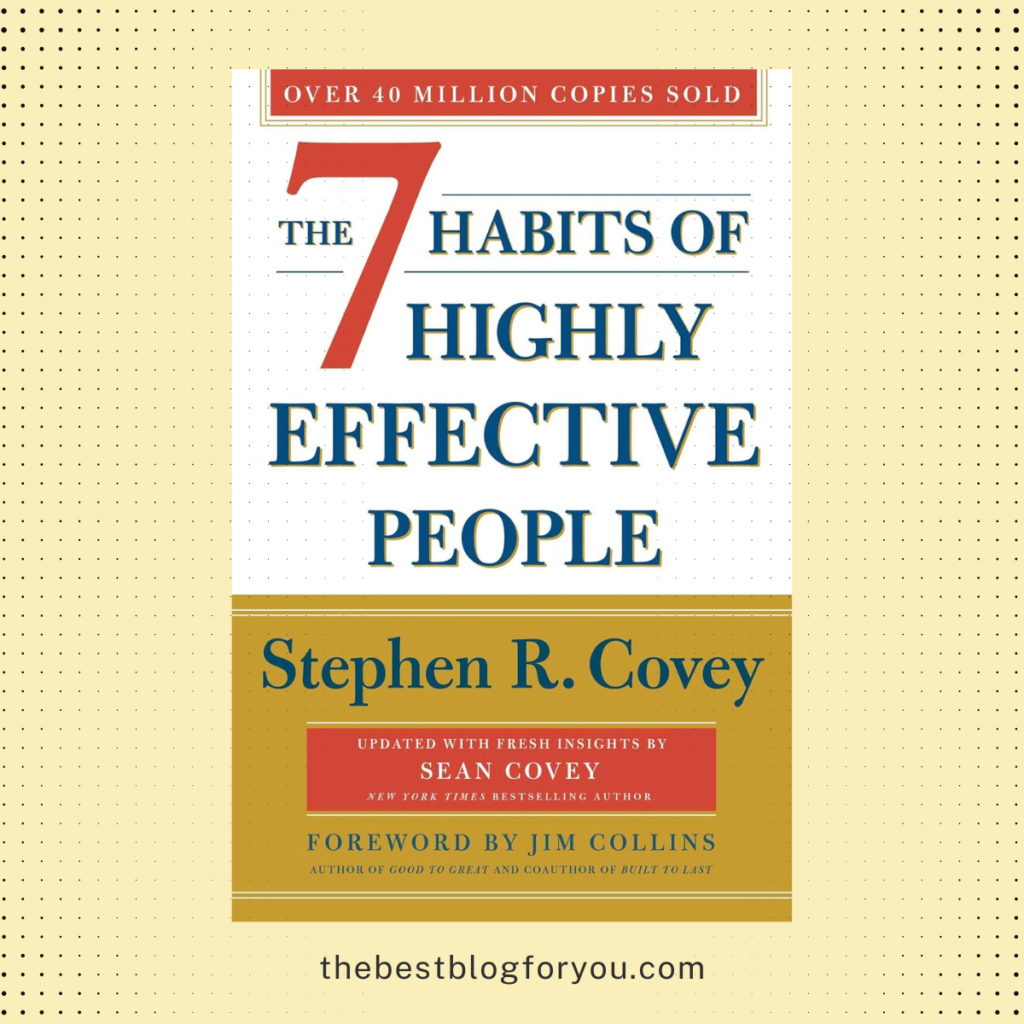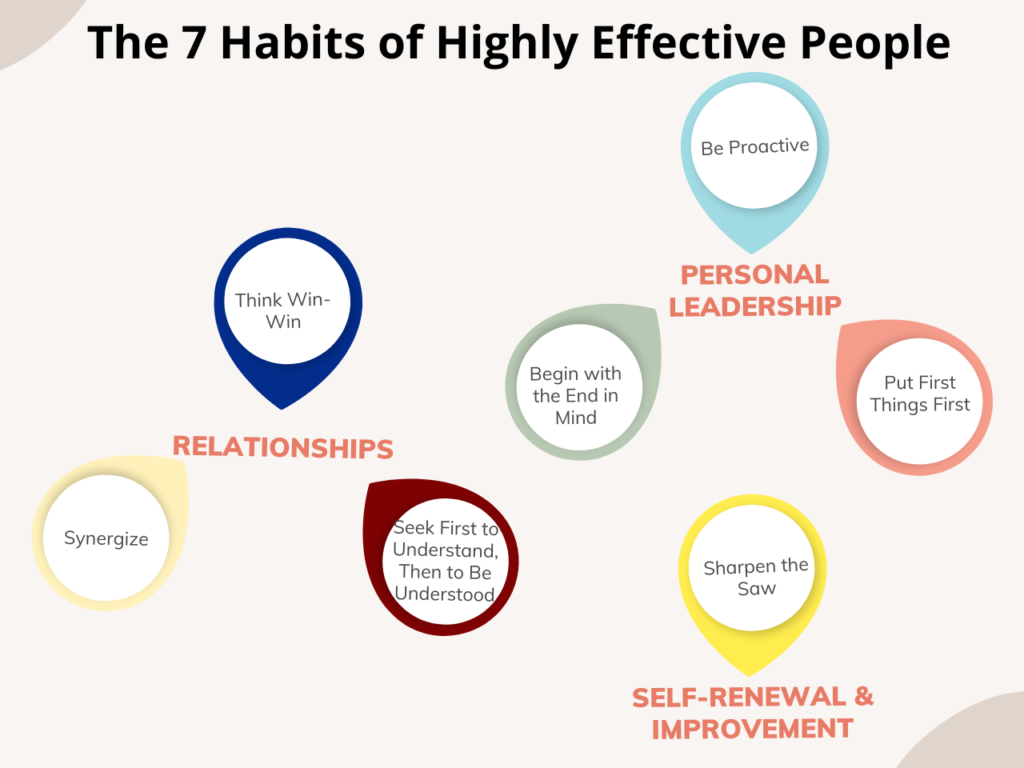
Intro
In a fast-paced world where distractions are plentiful and time is limited, the teachings of Stephen R. Covey in The 7 Habits of Highly Effective People offer invaluable insights into personal and professional effectiveness. This timeless self-help classic, first published in 1989, has stood the test of time, guiding countless individuals toward meaningful and sustainable success. This blog post will delve into key takeaways from the book, exploring each habit and how they can transform your life.
Introduction to the Seven Habits
Covey’s framework is a comprehensive guide to effective living, encompassing both personal development and interpersonal relationships. The first three habits—Be Proactive, Begin with the End in Mind, and Put First Things First—center on self-mastery, encouraging you to take control of your own actions and decisions. These habits lay the foundation for personal leadership by helping you align your behaviors with your values and goals.
The next three habits—Think Win-Win, Seek First to Understand, Then to Be Understood, and Synergize—shift the focus to how you interact with others. These principles are designed to enhance your relationships through mutual respect, empathetic communication, and collaborative problem-solving. They teach you how to create and sustain effective, harmonious relationships in both personal and professional settings.
The seventh habit, Sharpen the Saw, is about continuous self-renewal and improvement. It highlights the importance of maintaining a balanced life by nurturing your physical, mental, emotional, and spiritual well-being. This ongoing process of renewal helps you stay effective and resilient, ensuring that you can sustain the other six habits over the long term.

Be Proactive
The first habit, “Be Proactive,” emphasizes taking initiative and responsibility for your own actions and attitudes. Proactive individuals understand that they have the freedom to choose their responses to various situations, rather than being driven by external conditions. This mindset shift is foundational to achieving greater control over one’s life and outcomes. Covey introduces the concept of the “Circle of Influence” versus the “Circle of Concern,” urging you to focus your energy on areas where you can make a difference. By doing so, you avoid wasting time on factors beyond your control and instead channel your efforts into productive activities. This habit encourages you to adopt a growth mindset, where challenges are seen as opportunities to learn and grow.
Begin with the End in Mind
“Begin with the End in Mind” stresses the importance of having a clear vision for your life. Covey encourages readers to define their personal values and long-term goals, creating a roadmap for their actions. This habit emphasizes the power of visualization and goal-setting. By imagining your desired future, you can make conscious choices that steer you toward that vision.
A crucial takeaway from this habit is the concept of creating a personal mission statement. This document serves as a guiding compass, helping you align your daily activities with your overarching purpose. Covey highlights that knowing your end goal not only provides direction but also motivates you to stay committed to your objectives. By envisioning where you want to be, you ensure that your efforts and decisions contribute to meaningful progress and personal fulfillment.
Put First Things First
The third habit, “Put First Things First,” is all about prioritization and effective time management. Covey introduces the Time Management Matrix, which categorizes tasks into four quadrants: urgent and important, not urgent but important, urgent but not important, and neither urgent nor important. The core message here is to focus on the second quadrant—tasks that are important but not urgent. These activities often relate to long-term goals, personal development, and relationship building.
Covey emphasizes that by concentrating on these non-urgent but important tasks, you can proactively manage your life rather than constantly reacting to crises. This requires discipline and a clear understanding of your priorities, enabling you to say no to distractions and lesser tasks that don’t align with your values and objectives.
A practical application of this habit is to regularly plan and review your schedule, ensuring that you’re dedicating time to activities that contribute to your long-term success and well-being. Whether it’s setting aside time for strategic planning at work or making room for quality time with loved ones, putting first things first ensures that your actions are aligned with your most significant goals. This habit not only enhances productivity but also leads to a more balanced and fulfilling life.
Think Win-Win
The fourth habit, “Think Win-Win,” focuses on achieving mutual benefit in every interaction. Covey emphasizes that effective individuals strive for agreements and solutions that provide value to all parties involved. This approach moves away from the mindset of competition and towards one of collaboration, where relationships are seen as partnerships rather than adversarial encounters. A key aspect of this habit is the development of an abundance mentality, which is the belief that there are plenty of resources and success to go around. This mindset fosters a spirit of cooperation and trust, as opposed to fear and scarcity.
Another crucial element is the principle of integrity, ensuring that your actions are aligned with your values and commitments. By maintaining integrity, you build trust and credibility, making it easier to establish win-win agreements. Covey also discusses the importance of maturity, defined as the balance between courage and consideration. This balance allows you to express your needs and desires clearly while also respecting the needs and desires of others. Through empathy, proactive communication, and a genuine desire for mutual benefit, “Think Win-Win” transforms your interactions into opportunities for collaborative success, ultimately enhancing both personal and professional relationships.
Seek First to Understand, Then to Be Understood
Effective communication is at the heart of building strong relationships, and “Seek First to Understand, Then to Be Understood” is pivotal for mastering this skill. Covey emphasizes that most people listen with the intent to reply rather than to understand. To truly connect, we must listen empathically, meaning we should strive to understand another person’s perspective, emotions, and experiences without judgment.
Active listening involves fully concentrating on the speaker, reflecting on their words, and responding thoughtfully. This approach not only fosters mutual respect but also paves the way for more meaningful and productive conversations. By genuinely understanding others, we create an atmosphere of trust and openness, which can lead to better problem-solving and collaboration.
This habit encourages us to withhold immediate judgments or advice, and instead, seek to comprehend the full context of what is being communicated. It’s about making the other person feel heard and valued, which often prompts them to be more receptive to our own viewpoints. Covey’s insights remind us that empathetic listening is a powerful tool in both personal and professional interactions, helping to build deeper connections and facilitate mutual understanding.
Synergize
Synergy is the essence of teamwork and collaboration, as highlighted in the sixth habit, “Synergize.” Stephen R. Covey illustrates that when individuals work together, they can achieve far more than they could independently. This habit is about harnessing the strengths and perspectives of each team member to foster innovation and creative problem-solving. Covey emphasizes that differences should be seen not as obstacles but as opportunities to achieve new levels of understanding and performance.
One of the key components of synergy is open-mindedness and a genuine appreciation for diverse viewpoints. When team members feel valued and understood, they are more likely to contribute their best ideas and efforts. This collaborative spirit can lead to groundbreaking solutions that wouldn’t be possible if everyone thought and acted the same way.
Covey also underscores the importance of building trust and creating an environment where everyone feels safe to express their ideas and opinions. By doing so, you can leverage the collective intelligence of the group, making the whole greater than the sum of its parts. The synergy habit teaches us that through unity and mutual respect, we can unlock potential that might otherwise remain untapped, leading to extraordinary outcomes and strengthened relationships.
Sharpen the Saw
“Sharpen the Saw” focuses on the essential practice of self-renewal and continuous improvement across four dimensions: physical, social/emotional, mental, and spiritual. Covey emphasizes that neglecting any of these areas can lead to imbalance and reduced effectiveness in both personal and professional spheres.
Physical renewal involves maintaining your body through regular exercise, healthy eating, and adequate rest. Social/emotional renewal is about nurturing relationships and developing emotional intelligence. Engaging in activities that foster deep connections and emotional well-being can significantly enhance your resilience and overall happiness.
Mental renewal pertains to expanding your mind through continuous learning and intellectual growth. This could involve reading, taking up new hobbies, or engaging in stimulating conversations that challenge your perspectives. Keeping your mind active and curious allows you to adapt and innovate more effectively.
Spiritual renewal, while personal and unique to each individual, involves practices that ground and uplift you. This could be through meditation, prayer, time in nature, or other activities that align with your core values and beliefs.
By investing time and effort into these four dimensions, you create a sustainable foundation for personal growth and resilience. This holistic approach ensures that you stay balanced, effective, and ready to face the challenges and opportunities life presents.

6 thoughts on “Key Insights from The 7 Habits of Highly Effective People by Stephen R. Covey”